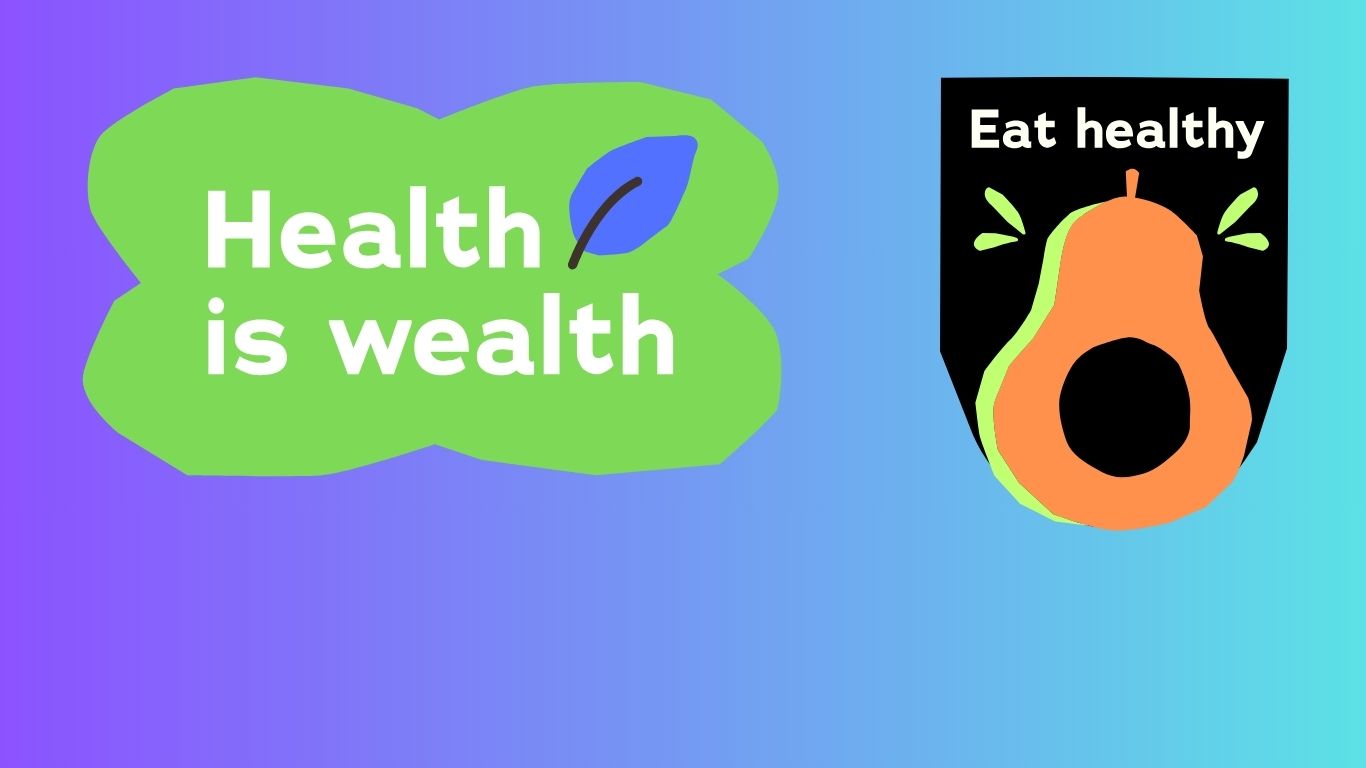Healthy eating habits are the foundation of overall health and vitality. In this detailed guide, we’ll delve into the complexities of developing a nourishing relationship with food. Understanding what healthy eating means and learning practical strategies for implementing it are important steps toward achieving optimal health and vitality.

Understand healthy eating habits
Healthy eating habits go far beyond simply choosing nutritious foods. It is a holistic approach to nutrition and health. Basically, a healthy diet focuses on consuming nutrient-dense foods that provide the essential vitamins, minerals, and other nutrients the body needs to function optimally. This module will review the basics of healthy eating and highlight the key elements that make up a balanced diet. Click here.
Definition and meaning
A healthy diet can be defined as the conscious and intentional choice of foods that promote overall health and well-being. It goes beyond simple care and focuses on nourishing the body with beneficial ingredients that support optimal physical and mental function. Healthy eating is a lifestyle choice based on awareness, moderation, and balance.
Key ingredients for a healthy diet
Macronutrients, micronutrients, and hydration are the foundation of a healthy diet. Understanding the role of each ingredient is essential to developing a complete and nutritious diet that promotes overall health and vitality.
Macronutrients, including carbohydrates, proteins, and fats, are the body’s main sources of energy. They provide the fuel needed to perform daily activities and support bodily functions. Consuming a balanced ratio of macronutrients is vital to maintain energy levels, promote muscle growth and recovery, and regulate metabolism.
Micronutrients, such as vitamins and minerals, play important roles in many physiological functions, including immune function, bone health, and metabolism. These micronutrients are essential for maintaining optimal health and preventing nutritional deficiencies.
Hydration is equally important for overall health and well-being. Water is essential for regulating body temperature, transporting nutrients and oxygen to cells, and removing toxins and waste. Adequate hydration is essential to keep the body functioning properly and maintain overall health.
Benefits of a healthy diet
The benefits of healthy eating go beyond physical health. It also has a profound impact on mental health and emotional stability. In this section, we will look at the many benefits of nutritious nutrition and how it can positively impact various aspects of your life. Visit here.
Physical health benefits
Maintaining a healthy diet is important for weight management, reducing the risk of chronic diseases, and promoting overall longevity. By consuming nutrient-dense foods and adopting healthy eating habits, people can achieve and maintain a healthy weight, thereby reducing the risk of obesity and related health problems, such as diabetes, heart disease, and some types of cancer.
Additionally, a balanced and nutritious diet can increase energy levels, improve athletic performance, and promote optimal physical functioning. By providing your body with essential nutrients and energy sources, healthy eating habits can improve endurance, strength, and overall athletic performance.
Mental health benefits
Beyond the physical benefits, eating healthy also has a profound impact on mental health and emotional well-being. Research has shown that a diet rich in fruits, vegetables, whole grains, and lean proteins is associated with a lower risk of depression, anxiety, and other mental disorders.
Additionally, healthy eating habits can improve mood, improve cognitive function, and reduce stress levels. By fueling the body with nutritious foods and avoiding processed foods high in sugar and unhealthy fats, people can maintain optimal brain function and emotional stability.
Common barriers to healthy eating
Despite the many benefits of a healthy diet, many people face challenges when it comes to adopting and maintaining healthy eating habits. In this section, we’ll look at some of the most common barriers to healthy eating and strategies to overcome them.
Expiry
One of the biggest barriers to healthy eating is not having the time to plan, prepare, and cook nutritious meals. In today’s fast-paced world, many people struggle to find time to prioritize meal planning and preparation, often turning to convenient but unhealthy fast food options.
To overcome this hurdle, it’s important to prioritize meal planning and preparation and set aside time each week to meal plan, shop, and prepare nutritious meals in advance. Sharing, meal prep, and using time-saving kitchen tools can help simplify the meal prep process and make healthy eating more manageable and sustainable.
Spending limits
Another common obstacle to healthy eating is the belief that eating nutritious foods is expensive and unaffordable. While it’s true that some healthy foods, like fresh produce and lean protein, can be more expensive than unhealthy, processed alternatives, there are countless cost-effective strategies for eating healthy on a budget.
One way to overcome budget constraints is to prioritize purchasing whole, unprocessed foods and avoid expensive processed and packaged foods. Buying what’s in season, buying in bulk, and using coupons and sales can also help keep grocery costs down and healthy eating more convenient.
Lack of knowledge or training
Many people have difficulty eating healthily due to a lack of knowledge or education about nutrition and eating habits.
In this section, we’ll address some common misconceptions about healthy eating and offer practical tips to help you expand your nutritional knowledge and make informed food decisions.
One of the most common misconceptions about a healthy diet is that it requires in-depth nutritional knowledge and complex nutritional principles. While a basic knowledge of nutrition can certainly be helpful, eating healthy doesn’t have to be difficult or stressful. By focusing on simple, whole foods and including a variety of nutrients in your diet, you can easily prepare nutritious, balanced meals without the need for extensive nutritional knowledge.
To overcome the barrier of limited nutritional knowledge, consider taking the time to learn basic nutritional principles and dietary guidelines. Resources such as trusted websites, books, and courses can provide valuable information and advice on topics such as macronutrients, portion control, and meal planning. Additionally, consulting a nutritionist can provide personalized advice and support to help you reach your nutritional goals.
Strategies for creating healthy eating habits
Now that we’ve explored the importance of healthy eating habits and identified common barriers to adopting them, let’s look at practical strategies for developing and maintaining a nutritious diet. From meal planning and mindful eating to portion control and hydration, these strategies will help you make positive changes in your eating habits and improve your overall health and well-being.
Meal planning and preparation
Meal planning and preparation are important parts of a healthy diet because they allow you to control your food choices and ensure you have nutritious options during your fast. Here are some tips to make meal planning and preparation a part of your daily routine:
- Batch preparation: Spend a few hours each week preparing large batches of staple foods like grains, proteins, and vegetables. Store these pre-prepared ingredients in the refrigerator or freezer and use them as a base for quick and easy meals all week long.
- Shopping Tip: Before you head to the store, take the time to plan your meals for the week and create a detailed shopping list. Stick to the perimeter of the store, where fresh produce, lean proteins, and whole grains are typically found, and avoid tempting aisles filled with processed and unhealthy foods.
- Healthy Recipe Ideas – Try new recipes and meal ideas to keep things fun and delicious. Look to cookbooks, food blogs, and online recipe databases for inspiration, and don’t be afraid to get creative with ingredient and flavor combinations.
careful diet
Mindful eating involves paying attention to the sensory sensations of food, as well as the hunger and satiety signals that the body sends. By practicing mindful eating, you can develop a healthy relationship with food and develop a greater sense of satisfaction and pleasure when eating. Here are some tips for incorporating mindful eating into your daily routine:
- Listen to your hunger cues. Pay attention to your body’s signals and eat when you’re actually hungry, not in response to external cues like stress or boredom. Likewise, respect your body’s satiety signals and stop eating when you feel full, instead of finishing everything on your plate out of habit or obligation.
- Eat mindfully: Slow down and savor each bite of your food, paying attention to the taste, texture, and aroma of the food. Avoid distractions like screens or multitasking while eating and instead focus on sensory experiences to nourish your body.
- Eat slowly: Take the time to chew each bite thoroughly and enjoy the experience of eating. Eating slowly allows your body to properly digest and absorb nutrients from food and also gives you the ability to recognize when you feel full and satisfied.
Portion control techniques
Portion control is a key aspect of healthy eating as it helps control calories and avoid overeating. By controlling your portions you can enjoy a wide variety of foods while maintaining a healthy weight and promoting your health and well-being. Below are some strategies to incorporate portion control into your meals:
- Use smaller plates. When serving food, choose smaller plates and bowls to control portion sizes and avoid overeating. Research has shown that people tend to eat smaller portions on smaller plates because this creates the illusion of a larger portion.
- Practice moderation: Eat your favorite foods in moderation instead of depriving yourself of certain foods or labeling them as “off limits.” By treating yourself occasionally, you’ll be able to satisfy your cravings and avoid feelings of deprivation, making it easier to maintain a balanced and sustainable diet.
- Consider portion sizes: Know the appropriate portion size for different types of foods and use visual cues, such as your hand or common household items, to estimate portion sizes when eating out or at a restaurant. Avoid mindless eating directly from a container or bag, as this can lead to unintentional overeating.
Embrace variety and balance
Variety and balance are key principles of healthy eating, as they provide a wide range of nutrients and flavors to the diet. By including a varied selection of foods and balancing macronutrients, you can create hearty, nutritious meals that support your overall health and well-being. Here are some tips on how to diversify and balance your diet:
The importance of diversity in food choices
Eating a variety of foods is essential to provide a wide range of nutrients in your diet. Try to include foods from all food groups in your diet, including fruits, vegetables, whole grains, lean proteins, and healthy fats, to ensure you’re meeting your nutritional needs and getting a healthy diet.
Macronutrient balance
A balance of macronutrients (carbohydrates, proteins, and fats) is essential for maintaining optimal health and energy levels. Try to include a source of each macronutrient at every meal and snack to stabilize blood sugar, prevent energy crashes, and promote satiety and satisfaction.
Include whole foods
Whole foods (foods that are minimally processed and kept as close to their natural state as possible) are rich in essential nutrients and health-promoting compounds. Focus on including a variety of whole foods in your diet, such as fruits, vegetables, whole grains, lean proteins, and healthy fats, to maximize your nutrient intake and support your overall health and well-being.
Hydration and its role in a healthy diet
Hydration is an essential part of a healthy diet and supports multiple body functions and processes. In this section, we will discuss the importance of staying well hydrated and provide practical advice on how to increase your water intake and maintain adequate hydration levels throughout the day.
The importance of adequate hydration
Water is essential for maintaining adequate hydration levels, regulating body temperature, eliminating toxins and waste, and supporting overall health and well-being. Dehydration can lead to many negative health effects, such as fatigue, headaches, lack of concentration, and reduced physical performance.
Strategies to increase water consumption
Many people have difficulty drinking enough water throughout the day and often prefer drinks that contain sugar or caffeine. To increase your water intake and maintain adequate hydration, consider implementing the following strategies:
- Drink water throughout the day. Make a conscious effort to drink water regularly throughout the day instead of waiting until you’re thirsty. Always carry a reusable water bottle with you and drink often to stay hydrated.
Fruit and Herb Infused Water: Add flavor to your water by adding fresh fruits, herbs and spices. Try different combinations like cucumber, mint, lemon, ginger or raspberry and basil. Create delicious, refreshing water that will encourage you to drink more throughout the day. - Eat foods rich in water. In addition to drinking water, you can increase your hydration levels by eating foods rich in water. Fruits and vegetables such as watermelon, cucumbers, strawberries and lettuce are excellent sources of hydration and can contribute to overall fluid intake.
Overcomes common nutritional problems
Despite our best intentions, we can face many nutritional challenges that can hinder our efforts to maintain healthy eating habits. In this section, we’ll look at some common eating problems, such as excessive sugar consumption, addiction to processed foods, and emotional eating, and offer strategies to overcome them.
Sugar consumption
Eating too much sugar is a common dietary problem that can have harmful health effects, including weight gain, increased risk of chronic disease, and energy blockages. To reduce your sugar intake and combat sugar cravings, consider implementing the following strategies:
- Read food labels. Watch out for hidden sugar in processed foods by reading food labels carefully and checking the ingredients list for added sugars. Look for alternative names for sugar, such as high fructose corn syrup, maltose and sucrose, and choose products with minimal added sugar.
- Choose natural sweeteners: Instead of refined sugar, sweeten foods and drinks with natural sweeteners like honey, maple syrup or stevia. These alternatives offer sweetness without the negative health effects associated with refined sugar and can help you satisfy your sweet tooth in a healthy way.
- Limit your consumption of sugary drinks. Cut down on sugary drinks like soda, fruit juices and flavored coffee, which are often high in sugar and empty calories. Choose fresh fruit-infused water, herbal tea or sparkling water to keep you hydrated without added sugar.
Processed food
Processed foods, which often contain refined sugars, harmful fats and artificial additives, can undermine our efforts to maintain a healthy diet. To reduce your reliance on processed foods and choose whole, nutritious foods, consider the following strategies:
- Cook at home: Prepare your meals at home using fresh, whole ingredients whenever possible, rather than relying on canned or prepared foods. Cooking from scratch allows you to control the quality and quantity of the ingredients in your meals and ensures that you are eating nutritious, unprocessed foods.
- Stock your pantry with whole foods: Stock your pantry with minimally processed whole foods, such as whole grains, legumes, nuts, seeds, and spices, that serve as the foundation for healthy meals and snacks. Cut back on processed snacks, sweets, and packaged foods and choose nutrient-dense alternatives.
- Practice reading labels: Check food labels and ingredient lists to identify processed foods and make informed decisions about the foods you buy. Look for products with short ingredient lists that contain known whole food ingredients and avoid products with long lists of artificial additives and preservatives.
Emotional eating
Many of us turn to food to calm down or relieve stress during times of emotional turmoil, which can lead to unhealthy eating habits and weight gain. To overcome emotional hunger and develop healthy coping strategies, consider implementing the following strategies:
- Identify triggers: Pay attention to the feelings and situations that make you want to eat, such as stress, boredom, loneliness, or sadness. By identifying your triggers, you can develop alternative strategies to cope with your emotions without turning to food.
- Practice mindful eating: Develop mindfulness and awareness of your eating habits by paying attention to the bodily sensations, thoughts, and feelings that arise before, during, and after eating. By slowing down and enjoying your food, you’ll be able to better understand your body’s hunger and fullness signals and make more informed decisions about what and how much you eat.
- Find healthy coping mechanisms. Instead of relying on food to control your emotions, explore alternative coping mechanisms that promote emotional well-being and stress reduction. Engage in activities such as exercise, meditation, journaling, spending time in nature, or connecting with supportive friends and family to relieve stress and improve your mood without resorting to emotional eating.
Create sustainable habits
Developing healthy eating habits isn’t just about making temporary changes to your diet. It’s about creating sustainable habits that you will maintain for the long term. In this section, we’ll look at strategies for setting realistic goals, tracking your progress, and finding support and accountability to ensure you maintain healthy eating habits.
Set realistic goals
When it comes to healthy eating, setting realistic and achievable goals is the key to long-term success. Instead of aiming for perfection or making drastic changes overnight focus on small, doable changes to your diet and lifestyle that you can maintain over time. Consider the following tips to set realistic goals:
- Start small: Start by identifying one or two specific areas of your diet or lifestyle that you would like to improve, such as eating more vegetables, drinking more water, or reducing the amount of sugar in snacks. Start with small, achievable goals that you can gradually expand as you gain confidence and momentum.
- Be specific and measurable. Make your goals specific and measurable by clearly defining what you want to achieve and how you will track your progress. Instead of setting vague goals like “Eat healthy,” set specific goals like “Eat one serving of vegetables for lunch and dinner five days a week” or “Drink eight glasses of water a day.”
- Celebrate Progress: Celebrate the successes and milestones of your journey, no matter how small. Recognize the progress you’ve made toward your goals and reward yourself for your efforts, whether it’s a non-diet reward or just a pat on the back for a job well done.
Track your progress
Tracking your progress is a powerful tool to stay motivated and accountable on your healthy eating journey. By tracking your diet, physical activity, and other related factors, you can gain valuable insights into your habits and behavior and identify areas for improvement. Consider the following tips to track your progress:
- Keep a food diary. Track what you eat and drink throughout the day by keeping a food diary or using a mobile app to record your meals and snacks. Record details such as portion sizes, ingredients, and how you feel before and after meals to gain insight into your eating habits and behaviors.
- Track your progress. Check your food journal or tracking app regularly to monitor your progress toward your goals and spot any patterns or trends that may be influencing your eating habits. Identify areas where you are performing well and areas where you can improve and adjust your goals and strategies accordingly.
- Be honest with yourself: Be honest and objective in tracking your progress, even if it means admitting setbacks or failures along the way. Remember that failure is a natural part of the change process and use it as an opportunity to learn and grow, not a reason to give up.
Looking for support and accountability
Having the support and accountability of others can greatly increase your chances of success in developing healthy eating habits. Whether you seek help from a friend, family member, or professional, having someone to encourage, encourage, and hold you accountable can make a big difference. Consider the following suggestions for support and accountability:
- Share your goals. Share your goals and intentions with friends, family, or colleagues who can provide support and encouragement throughout the process. Having a support system will help you stay motivated and accountable, especially during difficult times.
- I am looking for a friend. Teaming up with a friend, family member, or colleague who shares the same health and wellness goals can provide greater motivation and accountability. You can support each other, celebrate successes together, and hold each other accountable when you face temptations or setbacks.
Join a support group: Consider joining a support group or community that focuses on healthy eating and wellness. Whether it’s an in-person group, online forum, or social media community, connecting with like-minded people can provide valuable support, inspiration, and accountability as you work toward your goals.
Work with a professional. If you’re having trouble moving forward on your own, consider seeking advice from a dietitian, nutritionist, or health coach who can provide personalized guidance, support, and accountability. A professional can help you develop a personalized nutrition plan, overcome obstacles to healthy eating, and overcome challenges along the way.
conclusion
Developing healthy eating habits is a journey that requires commitment, consistency, and perseverance. By understanding the importance of healthy eating, identifying common barriers, and implementing practical strategies for success, you can develop a nourishing relationship with food and support your overall health and well-being.
Remember that healthy eating doesn’t mean perfection or deprivation. It’s about making informed decisions that align with your health goals and priorities. Start small, be patient with yourself, and celebrate the progress you make along the way. With dedication and persistence, you can create lasting habits that will nourish your body, mind, and spirit for years to come. Let’s drink to your health and happiness!





